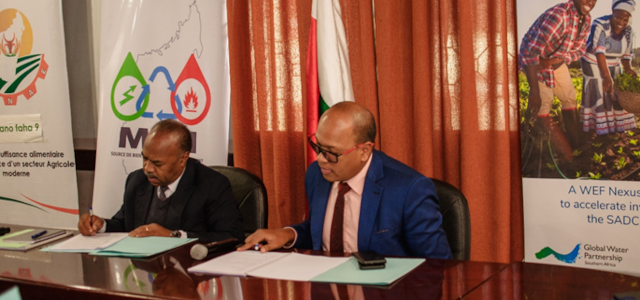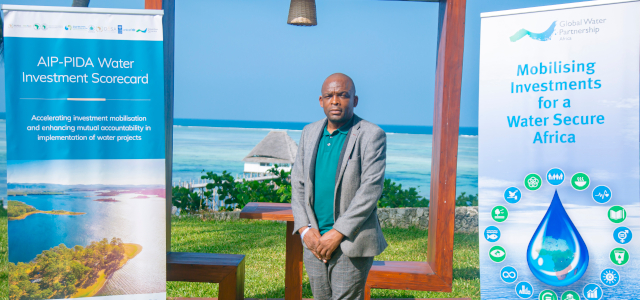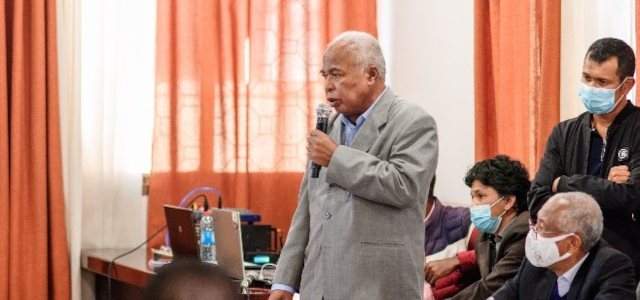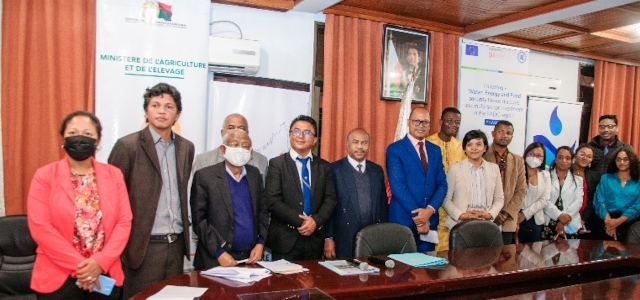This commitment was made by Madagascar’s Minister of Agriculture and Livestock, His Excellency Ramilison Harifidy, who was among three ministers who attended the Water, Energy, and Food, (WEF) Nexus National Dialogue in Madagascar on Thursday, 5 May 2022.
The two other Ministers who attended the meeting included His Excellency Ravokatra Fidiniavo, Minister of Water, Sanitation, and Hygiene (MEAH) and His Excellency Andry Ramaroson Minister of Energy and Hydrocarbons (MEH).

Minister of Energy, His Excellency Andry Ramaroson (left) and Minister of Agriculture, His Excellency Harifidy (Right) attend the Madagascar WEF Nexus National Dialogue
Officially opening Madagascar’s first WEF National Dialogue, Minister of Agriculture and Livestock (MinAE), His Excellency Harifidy said there was a close linkage between the WEF approach and Madagascar’s National Strategy and Policy documents where energy and water are part of pillars to the country’s economic development.
He highlighted some of the immediate goals of Madagascar’s government planned for the next five years including doubling the energy supply and reducing associated energy costs, increasing water supply through the Integrated Water Resources Management (IWRM), ensuring food self-sufficiency through aquaculture, crop and livestock production, and sustainable management of natural resources achieved through reforestation.
“The government of Madagascar is therefore resolved, in accordance with the Nexus approach, to do everything possible to ensure that the project that has been set up for the country is successfully carried out in partnership with SADC and GWPSA, with funding received from the European Union. I thus want to reiterate our commitment and our will to set up the technical working group which will serve as a reference point for the realization, and the follow-up of the progress for this project.” said H.E Harifidy.
SADC’s Senior Programme Officer, Dr. Patrice Kabeya commended Madagascar for its commitment to supporting the WEF Nexus engagements demonstrated through the presence of all three-line ministers involved in the project and various stakeholders from government ministries, academia, UNICEF, and development partners.

“One of the expected key outcomes of this event is the establishment of a technical working group is to facilitate continuous engagements in Madagascar”, said Dr. Kabeya. Stakeholders in Water, Energy, and Food sectors who attended the dialogue urged the government of Madagascar to create an enabling environment for the private sector to get involved in the implementation of investments that solve overarching challenges in the Water, Energy, and Food Sectors in the country.
Stakeholders further recommended that the government should strengthen public-private-partnerships (PPP) to accelerate implementation of projects in all three sectors.
Deliberations during the event identified some key challenges that could hinder the implementation of the WEF Nexus in Madagascar including inadequate funding and incapacitated governance structures that limit private sector involvement in investment planning.
The Government of Madagascar hosted the WEF Nexus national dialogue to provide a platform for stakeholders to discuss an integrated approach to resolve challenges in the Water, Energy, and Food (WEF) Nexus.
The national dialogue was organised under the Southern Africa Development Community- SADC-WEF Nexus Regional Dialogue Project called "Fostering Water, Energy, and Food Security Nexus Dialogue and Multi-Sector Investment in the SADC Region: Phase II", which is being funded by the European Union and is implemented by Global Water Partnership Southern Africa (GWPSA) on behalf of SADC.
“The SADC WEF Nexus Project is being implemented in two phases. The first phase commenced in 2017 and ran up to 2020, which saw the development and adoption of SADC governance framework and a WEF Nexus screening tool” said Mrs. Shamiso Kumbirai- Mlilwana, GWPSA SDG Water Investments Specialist. The project is currently in Phase two which aims to institutionalize WEF Nexus and accelerate WEF Nexus investments to enable transformation that will address water, energy, and food security in the SADC region, in a changing climate.
Providing an overview and background to the SADC Nexus Regional Dialogue Phase II and linkages to investment opportunities, Mrs. Kumbirai-Mlilwana, emphasized the importance of high-level political support and ownership, as well as continuous multistakeholder engagements to keep driving the WEF Nexus agenda at the country level.
Further, perspectives shared through Madagascar’s background paper presentation by the Madagascar WEF Nexus expert Mr. Daniela Rabeharisoa outlined how the WEF Nexus approach could be applied as an essential tool to propel Madagascar to water, food, and energy security in the face of climate change.

The dialogue identified national WEF Nexus investments that have a potential to be added to the AIP SDG Water Investments Support Programme’s project pipeline for further preparation support. These included projects focused on multipurpose hydroelectric dams, renewable energy, integrated water resources management (IWRM), as well as strengthening the existing institutions and structures.
